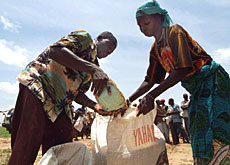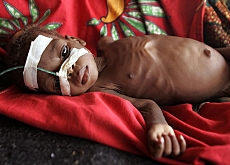Niger food-aid cuts divide opinion

Swiss aid agencies are at loggerheads over United Nations plans to scale down emergency food distribution in Niger.
The Swiss Agency for Development and Cooperation (SDC) agrees with the decision, but the Swiss branch of Médecins Sans Frontières (MSF) has warned it could lead to further deaths.
The UN World Food Programme has announced that it will end its general distribution and target only the most needy areas when Niger’s harvest begins next month.
Peter Bieler, who heads the SDC bureau in the West African nation, told swissinfo the cuts make sense as there is a danger that a glut of free food in the country at harvest time could damage the market.
“The UN view that it should stop general distribution is generally supported in Niger,” he said.
“If the World Food Programme is distributing when farmers want to sell their crops then food prices could either go up even higher or crash.”
But Bieler warned that Niger’s problems may not be over, despite good rains and an absence of locusts in the country.
“We still don’t know for sure how good the harvests will be,” he said. “The signs look good, but we don’t know if the farmers were fit enough to plant all their fields with crops when things were at their worst in June.
“If the harvest is not as good as suspected then general food distribution may have to start again.”
Dire consequences
But the Swiss branch of MSF is less convinced that scaling down food aid is a good idea. It is warning that many people in Niger may suffer as a result.
“We are concerned to hear the World Food Programme talking about stopping the distributions after the start of the harvest,” MSF-Switzerland director Christian Captier told the AFP news agency.
“The most destitute families will need a security net to survive. Food aid was delayed for months and months, and now the plan is to stop it?”
Bieler, however, points the finger of blame at some local families for failing to ensure that food is properly distributed.
“Malnutrition is not just a case of food availability. It is also about how individual households are distributing food,” he said.
“Sometimes the last or second-last born child is not getting food. We need to address the issue that some families are not caring for their children.
“The reality is that children are dying, but it does not necessarily mean the household is poor or out of food.”
For its part, the Swiss Red Cross believes that the harvest will blunt the need for emergency food aid across the board.
“The rainy season has started well and there is a good harvest forecast for October,” said spokesman Karl Schuler.
swissinfo, Matthew Allen
Niger’s prime minister, Hama Amadou, welcomed the plan to end general food distribution, saying the country’s dignity had suffered as a result of donations.
Médecins Sans Frontières estimates that a million people are still short of food.
At the height of the food shortage crisis, the UN estimated that 3.6 million people in Niger were affected.

In compliance with the JTI standards
More: SWI swissinfo.ch certified by the Journalism Trust Initiative



You can find an overview of ongoing debates with our journalists here . Please join us!
If you want to start a conversation about a topic raised in this article or want to report factual errors, email us at english@swissinfo.ch.